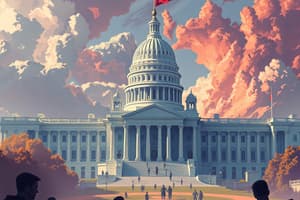Podcast
Questions and Answers
The federal system can be best defined as?
The federal system can be best defined as?
- A system where governmental authority is divided into separate branches and each branch is given some power over the other branches.
- The sharing of legislative powers between an upper and lower house.
- A system of government in which power is divided between a national government and lower levels of government. (correct)
- A system of government where member nations meet in a multinational conference.
- A system in which the power of the central government is funded through taxation of the local government.
The specific powers granted to Congress in Article I, Section 8 of the U.S. Constitution are called the ________ powers.
The specific powers granted to Congress in Article I, Section 8 of the U.S. Constitution are called the ________ powers.
- Implied
- Expressed (correct)
- Sovereign
- Executive
- Absolute
________ occurs when a state grants a city the ability to govern its own local affairs.
________ occurs when a state grants a city the ability to govern its own local affairs.
- Dual federalism
- Separation of powers
- Home rule (correct)
- City governance
- Ostracism
A definitive role for the states in the American federal republic was preserved by the ________ Amendment.
A definitive role for the states in the American federal republic was preserved by the ________ Amendment.
________ powers exist when both state and national governments possess a certain level of authority.
________ powers exist when both state and national governments possess a certain level of authority.
A state government's authority to regulate the safety, health, and morals of its citizens is called ________ power.
A state government's authority to regulate the safety, health, and morals of its citizens is called ________ power.
Which of the following statements best describes the history of American federalism?
Which of the following statements best describes the history of American federalism?
What was a major reason that the slogan 'states' rights' became tarnished in the 1950s and 1960s?
What was a major reason that the slogan 'states' rights' became tarnished in the 1950s and 1960s?
Which event was most influential in the rise of a more active national government?
Which event was most influential in the rise of a more active national government?
'Marble cake federalism' is associated with?
'Marble cake federalism' is associated with?
What are implied powers?
What are implied powers?
What are the three levels of government?
What are the three levels of government?
What is preemption?
What is preemption?
Theorists such as Montesquieu referred to the principle of giving each branch of government a distinctly different constituency as?
Theorists such as Montesquieu referred to the principle of giving each branch of government a distinctly different constituency as?
Study Notes
Federalism
- Federalism involves a government structure where power is divided between a national government and lower levels of government.
- States can grant cities the authority to manage local affairs, known as "home rule."
- The Tenth Amendment of the U.S. Constitution affirms the role of states in the federal republic by reserving powers not delegated to the national government.
Powers of Congress
- The powers explicitly granted to Congress are termed "expressed powers," as specified in Article I, Section 8 of the Constitution.
- Concurrent powers are those held by both state and national governments, allowing for shared authority.
- "Police power" refers to a state's authority to regulate safety, health, and public morals.
History and Evolution of Federalism
- American federalism has historically been marked by debate regarding the allocation of responsibilities between federal and state governments.
- The term "states' rights" became controversial in the 1950s and 1960s, primarily due to its use by southern opponents of the civil rights movement to justify racial segregation.
- The Great Depression significantly influenced the expansion of a more active national government.
Federalism Models
- "Marble cake federalism" describes intergovernmental cooperation that blurs the lines between various levels of government.
- Implied powers allow Congress to create laws deemed "necessary and proper" to execute its expressed powers.
Structures of Government
- The government operates at three levels: federal, state, and local.
- Preemption is a principle that permits the national government to take precedence over state or local actions in specific policy areas.
Theoretical Foundations
- Montesquieu's concept of a "mixed regime" emphasizes giving each governmental branch a unique constituency to ensure checks and balances.
Studying That Suits You
Use AI to generate personalized quizzes and flashcards to suit your learning preferences.
Description
Test your knowledge of federalism in this flashcard quiz based on Chapter 3 of POS 2041. You'll explore the definitions, structures, and principles that define federal systems of government. Ideal for students looking to reinforce their understanding of political science concepts.




